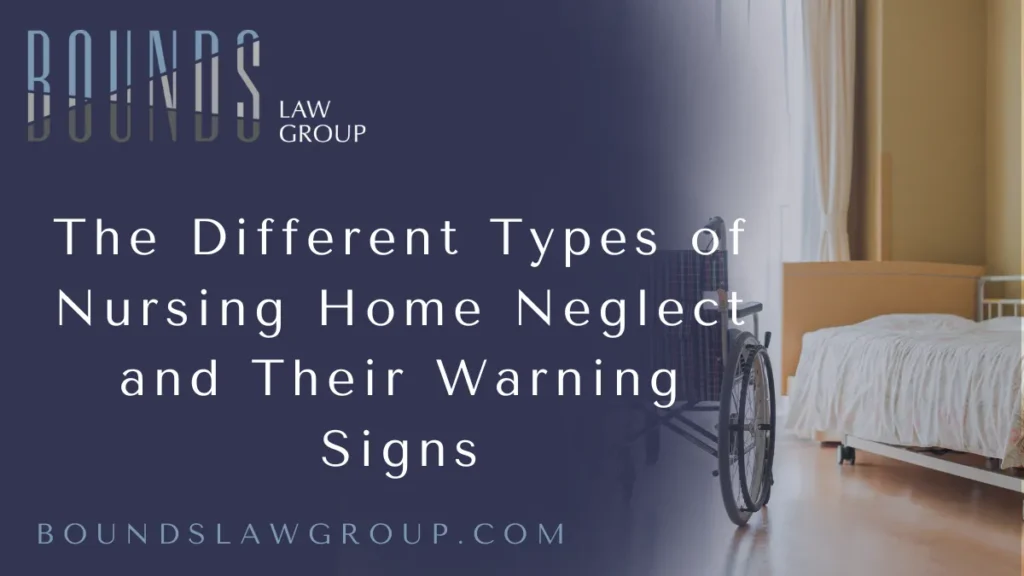
Bounds Law Group | Your Nursing Home Neglect Lawyers
Nursing home neglect is a severe issue that affects thousands of elderly residents across the country. Families trust nursing homes to provide compassionate and adequate care, but unfortunately, neglect can occur in various forms. Understanding the types of nursing home neglect and recognizing the warning signs can help protect vulnerable loved ones from harm. Bounds Law Group has experience handling these types of cases for nearly three decades.
Complete our free case evaluation form or call us now at 877-644-5122 to schedule a consultation.
What is Nursing Home Neglect?
Nursing home neglect occurs when caregivers fail to meet a resident's basic needs, leading to physical, emotional, or medical harm. Unlike outright abuse, neglect is often characterized by inaction rather than intentional harm. The consequences of nursing home neglect can be devastating, leading to serious health complications, emotional trauma, and even wrongful death.

Medical Neglect
One of the most dangerous types of nursing home neglect is medical neglect, which occurs when staff fail to provide proper medical care. This includes failing to administer medications, ignoring symptoms of illnesses, or neglecting chronic conditions like diabetes or heart disease.
Warning Signs of Medical Neglect:
- Unexplained weight loss due to missed meals or dehydration
- Worsening of chronic conditions without medical intervention
- Frequent infections or bedsores (pressure ulcers)
- Delayed response to medical emergencies
- Untreated pain or discomfort
Neglected medical care can lead to severe health deterioration and, in some cases, death. If you suspect medical neglect, immediate action is crucial.
Personal Hygiene Neglect
Elderly residents often require assistance with personal hygiene, including bathing, oral care, grooming, and dressing. When caregivers fail to provide this essential support, residents can suffer from severe hygiene-related issues.
Warning Signs of Personal Hygiene Neglect:
- Strong body odor and unkempt appearance
- Dirty or unchanged clothing and bed linens
- Untreated dental problems, such as cavities or gum disease
- Untrimmed nails and unwashed hair
- Presence of lice or bedbugs
Lack of hygiene care can lead to infections, discomfort, and emotional distress. Proper grooming and cleanliness are essential for maintaining dignity and health.
Emotional and Social Neglect
Isolation and emotional neglect can have severe psychological effects on elderly residents. When caregivers ignore, dismiss, or refuse to engage with residents, it can lead to loneliness, depression, and anxiety.
Warning Signs of Emotional Neglect:
- Sudden withdrawal from social activities
- Depression, anxiety, or frequent crying
- Fear or distrust of caregivers
- Loss of appetite or difficulty sleeping
- Unexplained mood swings or agitation
Elderly individuals need emotional support and social interaction to maintain their well-being. A nursing home should provide a nurturing and engaging environment for its residents.
Basic Needs Neglect
Care facilities are responsible for ensuring residents have access to food, water, shelter, and a clean environment. When these fundamental necessities are ignored, the consequences can be dire.
Warning Signs of Basic Needs Neglect:
- Malnutrition and dehydration
- Unsanitary living conditions (dirty floors, mold, pests)
- Extreme room temperatures (too hot or too cold)
- Inadequate clothing for the season
- Lack of necessary mobility aids (walkers, wheelchairs, hearing aids)
Proper care involves more than just medical attention—it requires ensuring residents live in safe, clean, and comfortable environments.
Neglect Leading to Falls and Injuries
Elderly individuals are at high risk for falls due to mobility issues. When staff fail to provide necessary support, such as assistance with walking, proper supervision, or the use of mobility aids, serious injuries can occur.
Warning Signs of Neglect Leading to Falls:
- Unexplained bruises, cuts, or fractures
- Frequent falls or injuries
- Absence of railings or safety equipment
- Delayed response to calls for assistance
- Improperly fitted footwear or lack of walking aids
A safe environment with adequate supervision is critical to preventing falls and ensuring the well-being of residents.
Nutritional Neglect
Proper nutrition is essential for elderly individuals to maintain their health, energy levels, and immune system. When nursing home staff fail to provide well-balanced meals or neglect dietary needs, residents can suffer from malnutrition, dehydration, and related health complications.
Warning Signs of Nutritional Neglect:
- Significant and unexplained weight loss
- Constant complaints of hunger or thirst
- Dry skin, cracked lips, and sunken eyes (signs of dehydration)
- Fatigue, dizziness, or frequent infections
- Serving meals that do not align with dietary restrictions or medical needs
Nutritional neglect can weaken the body’s defenses and lead to serious illnesses. Nursing home residents should receive appropriate meals that meet their dietary and medical requirements.

Legal Options for Victims of Nursing Home Neglect
If you suspect that your loved one has been a victim of nursing home neglect, legal action may be necessary to hold the responsible parties accountable. At Bounds Law Group, we specialize in protecting the rights of nursing home residents and their families. Our experienced attorneys can help you seek justice and obtain the compensation your loved one deserves.
What You Can Do:
- Document evidence of neglect, including photographs and medical records.
- Report neglect to the nursing home administration and regulatory agencies.
- Seek medical attention for any injuries or health complications.
- Consult with a nursing home neglect attorney to explore legal options.
Get Legal Help Today
Nursing home neglect should never be ignored. If you suspect your loved one has suffered due to neglect, take action immediately. Contact Bounds Law Group for a free case evaluation form or call us now at 877-644-5122. Our team is ready to fight for justice and ensure your loved one receives the care they deserve.
Sources
- National Institute on Aging - A government organization providing information on elder care and neglect prevention. Visit here
- Centers for Disease Control and Prevention (CDC) - Data and research on elder abuse and neglect statistics. Visit here
- National Consumer Voice for Quality Long-Term Care - Advocacy and resources for families of nursing home residents. Visit here

